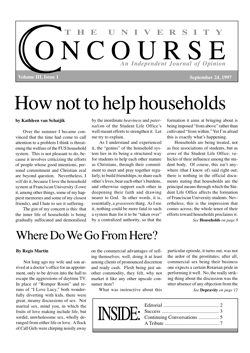Filling out the meaning of the term ‘Charismatic’
by Jim Weiner
I was encouraged by Alicia Hernon’s and Kathleen van Schaijik’s articles in the May 6 issue of the Concourse. The discussion about so-called “charismatic” and “traditional” spiritualities assumes a right understanding of the terms “charismatic” and “traditional;” yet we really have not understood these terms correctly. These two women’s articles have finally begun to address this misunderstanding.
The charismatic gifts are part of our Christian inheritance. They are an integral part of our Christian life and community. “It is not only through the sacraments and the ministrations of the Church that the Holy Spirit makes holy the People of God, leads them and enriches them with his virtues. Allotting his gifts according as he wills (cf. 1 Cor. 12:11), he also distributes special graces among the faithful of every rank” (Vatican II, LG #12).
We, “the faithful of every rank,” all can use charismatic gifts. Such gifts are one part of normal Christian living. As Mrs. Hernon said, the use of charismatic gifts is not an optional spirituality. Rather, these gifts belong intrinsically to the spirituality of all the baptized. The seeking of and the use of the gifts is acceptable, encouraged in the Word of God, normal, and necessary for the Church. “By these gifts He makes them fit and ready to undertake various tasks and offices for the renewal and building up of the Church, as it is written, ‘the manifestation of the Spirit is given to everyone for profit’ ” (LG #12).
The choice to seek and use the gifts is based on God’s will, not personal preference, temperament, cultural background, etc. Sacred Scripture, Sacred Tradition (as witnessed to by Doctors of the Church as great as Chrysostom, Cyril of Jerusalem, Hilary of Poitiers (cf. [Fanning the Flame, Liturgical Press, 1991]), and the teaching office of the Church all see the use of charismatic gifts as normal to Christian living (cf. CCC, #‘s 688, 799-801, 951, 2003 and Vatican II documents: AGD, #4; A.A., #3; LG, #4, #12). “Charisms are to be accepted with gratitude by the person who receives them and by all members of the Church as well. They are a wonderfully rich grace for the apostolic vitality and for the holiness of the entire Body of Christ, provided they really are genuine gifts of the Holy Spirit and are used in full conformity with authentic promptings of this same Spirit, that is, in keeping with charity, the true measure of all charisms” (CCC, #800).
Using the gifts is both the birthright and the solemn responsibility of every Christian. St. Paul urged the Corinthian believers to earnestly desire the spiritual gifts. He wrote, “Now I should like all of you to speak in tongues, but even more to prophesy” (1 Cor. 14:5). Furthermore, he wrote that these gifts should be used in the assembly of the Church. In 1 Cor. 10-14, he gives instructions about the public liturgy of the church: the worthy celebration of the Eucharist, the manifestation of spiritual gifts, and the charity that must permeate all. He writes, “When you come together, everyone has a hymn, or a word of instruction, a revelation, a tongue or an interpretation. All of these must be done for the strengthening of the church” (1 Cor. 14: 26). The context of this chapter shows that this “coming together” was for the celebration of the Eucharist. If we want to be truly Traditional Catholics, we must embrace the use of the charisms that are fundamental to the Church’s identity. Were it not for the work of the Holy Spirit through the charismatic, as well as the sanctifying and hierarchical gifts, we would not have the beautiful Tradition that we know as Roman Catholicism.
Charismatic gifts are only possible because the Holy Spirit is with us. And it is only by the Holy Spirit (CCC, #1266) that we can know Jesus as Lord (1 Cor.12:3), know God as Father (Rom. 8:14-16), grow in holiness (Rom. 8:1-27; Gal. 5:16-25; CCC, #2003), and build the Church. At our baptism we have received the Holy Spirit, the third Person of the Blessed Trinity. Therefore, we can have a personal relationship with Him and we can ask Him to empower us to know God, grow in holiness, and build the Church. We are called to constantly “fan into flame the gift of God” given to us at our baptism and confirmation, that is, the gift of the Holy Spirit (2 Tim. 1:6-7). In other words, we need the Holy Spirit not just for charismatic gifts, but in order to even be Christian and know God.
The use of charismatic gifts is one part of the normal Christian life and therefore cannot be relegated to certain types of individuals or movements. As Mrs. Hernon said, “These gifts are for every Catholic, because this life in the Spirit is not one spirituality of the Church, but the spirituality of the Church.” Therefore, in the words of Mrs. van Schaijik, to deliberately suppress charismatic gifts or to banish them “from the liturgies, which are the heart of our communal life, could amount to a rejection of a divine gift, and a betrayal of the specific mission of our University.” God’s Word says, “Therefore, my brothers, be eager to prophesy, and do not forbid speaking in tongues” (1 Cor. 14: 39).
Not only should gifts not be banned from the liturgy, they should also be encouraged in our daily lives and ministries. Personally, I thank God for the renewal of the charisms we have seen since Vatican II, where Pope John XXIII prayed to the Lord: “Renew your signs and wonders in our own day, as by a new Pentecost.” The Lord answered this prayer. May we be faithful to this mighty move of God.
Jim Weiner, Class of ‘96
Jim Weiner is currently studying in the MA Theology Program.


